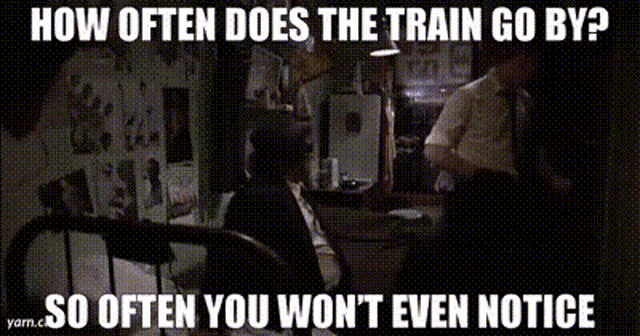Woah this is my screenshot
that’s crazy
It’s neat how much the image has degraded
Edit: original image
Title text: “If you can read this, congratulations—the archive you’re using still knows about the mouseover textâ€!
Close but the whole thing needs to be a progression of screen grab of phone cam shot of desktop monitor with full moire interference lines
Fun fact: what that audio guy was describing is called “room tone” and correct it’s used for both patching and as a base sitting under all the other audio elements for the mix (music, dialogue, sound FX) and is a common practice after a on location shoot is wrapped to have the whole set “hold for tone”.
The reasoning being it captures the 3D soundscape of the ambient noise in the space and how those noises bounce off surfaces and people that our ears definitely notice when it’s missing like your post says! The reverb of a small office room and a gym would have very different room tones for example. And an absolute void in audio is extremely distressing and it’s why you almost never have absolute 0dB in a sound mix unless intentional.
Source: work in professional production
This is also why all online meeting tools and teleconference systems also have a background tone. It tells you that you’re still connected, you’re live.
I should know exactly what you’re talking about. But not sure I do. Will listen for the slight lack of nothing next time.
a form of squelching
Sold
an absolute void in audio is extremely distressing
“Here, can you handle this?”
— Alanis Morissette
Wait, why did she say that?
In her song All I Really Want, there’s a measure of complete silence after the lyrics “Why are you so petrified of silence? Here, can you handle this?”
Oh. I’m dumb, I was making a joke because I thought they were implying that listening to her was a bad time but it turns out it really was a quote. I got wooooshed this time.
Edited to add: I mean no offense to fans of Alanis Morissette, to be clear. I don’t think I’m super familiar with her discography.
Genuine question, what do you do for outer space? I know what you mean by a complete audio void being unsettling, and I’ve seen sci-fi movies where using complete audio void for space enhances the anxiety of the scene very well. But when it’s not a complete audio void, what simulates space silence?
It should be the sound of the machines on board, but now I also wonder what is used
Well if you mean creatively, there’s lots of options. But yes, using a complete void of audio can also be an intentional creative choice to force you to feel certain things, I believe 2001 did this for a lot of the external space shots. Cut to black endings to a lot of movies use an empty block of audio too as a punctuation.
A lot of other movies/shows use a lot of different creative options. Like if you’re exposed in space you’d hear your heart and blood pressure sky rocket before stopping, maybe your last breath of oxygen molecules vibrating in your cranium like The Expanse did. You could maybe create the sound of an exposed star bombarding you too. Star Trek often uses ambient engine noises or their ships to fill any empty space in the mix. Another common example is if you’re in a space suit, you’d hear the internal machines and your heartbeat would be super loud. All of these are creative choices of course and not meant to be realistic, which nothing really is meant to be in a movie mix.
Is it not also useful to record the ambiant noise in order to subtract the noise from a record you want as clean as possible?
It will not allow you to just subtract the noise, as specific sound will slightly differ each time, but knowing characteristics might help. But if you plan on doing this, you’re better off with using several microphones in different places, afaik
I remembered doing that during home recording. I had a tool that required to record the background noise and then I could apply it to my actual record to reduce the background noise on it.
Im confused. How exactly is the room tone used? Is replayed in the background during something like an A roll?
It’s used in a number of different situations, but its most common use is as fill during dialogue cuts: let’s say you want to put two different pieces of dialogue together, but have a natural pause between them, room tone is necessary to maintain continuity.
In a study during World War II regarding comprehensibility in radio communications, radio static was less destructive to understanding an interrupted statement than no sound at all.
Also, one of the most effective forms of jamming was a recording of multiple voices all talking over each other, it made it virtually impossible to make out who you wanted to hear.
Oh wow. Really interesting. Thanks
Not a professional, but studied it in college. It’s mostly to either fill in gaps or loud noises.
One thing you can often do is get a “noise print” of the room, and you can isolate someone’s audio basically perfectly. From there you can create a room tone and slap it under the entire track. Now if you need to mute or something you just cut the talking track and the room noise carries over.
If you don’t get a good room tone, say you want to use someone looking at the camera, but the director was talking. If you try to filter out the directors voice, it’s likely going to sound weird because some of the tones overlap with the room. So you mute it and slap the room tone over and you’re good. They often get too much, because room tones vary ever so slightly. If you get a tiny half second sample, unless you get very lucky you’ll pick up that something is repeating or sounds weird. If you have 10-20 seconds you can loop that no problem.
Oof yeah noise reduction and frequency remover tools can be awesome or really frustrating.
They say you can count the jpg artifacts to determine a memes age.
There’s always an xkcd
It’s not abut the memes, it’s about how many tags & UIs it collects along the way.
Degraded and censored. Thanks for showing the original.
Got any proof ?
/s
You can tell by the pixels.
How ?
I’ve seen quite a few shops in my time
What ?
How did we get here
Yes
Maybe
No, for sure.
Perhaps
Ouch, 181 KB.
OP’s 117 KB version loaded much faster over my BAUD.* (Now there’s a noise nothing like silence… brrrmmm dadung dadung)
*
Uhh, “my 8000 BAUD” / “56k”? Not quite nerd enough here.
Sparkling water tastes like when your foot falls asleep.
It also tastes like TV static
My buddy once bought a few cans of Space Coke for us to try. I told him it tasted like TV static. He said “well technically, TV static is interference from space, so it literally tastes like space”.
Instructions unclear; foot stuck in mouth
Just like me on a date!
Heyyoooo!
Ooh! Self burn, those are rare!
May my self immolation warm your heart.
Sparkling water tastes like coins to me.
You mean when your foot wakes up?
I love the raspberry & lime foot falling asleep
As someone who has done plenty of sound recordist work, it’s known as ‘room tone.’
Also, I feel seen because I’ve had to explain that so many times. Even to people who really should know.
Ditto. We call it ‘atmos’ here.
Conclusion of a stupid brain: Dolby sells nothing, their top cinema technology
I don’t work in a sound recording space, but I know this because I had to do a voice recording for a project in middle school.
The recording picked up some extraneous noise in between a couple sentences, so I opened Audacity, took the noisy chunk, and deleted it outright so that there was empty space. It sounded very weird for some reason… so I simply recorded over the gap with me doing nothing, as if I were in between sentences. It worked! And I had no idea why…
Granted, this was less ‘room tone’ than ‘white noise from the amount of gain on my shitty mic’, but same concept.
Terry Pratchett writes about this, how there is a difference between the sound of someone not being there and the sound of someone hiding and not making any noise.
He often writes about how things like bird song can be a type of silence and how a train that always passes at the same time every night, not passing at that time, can wake you up from its absence.
I used to live right next to a big ol’ belltower. It’d chime every hour and on special days, it’d be chiming throughout the day. A friend came to stay and was baffled at how I could sleep and work through it all
I grew up half a block from elevated railroad tracks and it’s the same. People visiting kept noticing the trains going by regularly, but I’d been tuning it out all my life and had to work to consciously hear it.
Later in life I visited my childhood home as an adult, and spent the night. It had been long enough since I’d left that I began noticing the damn trains, and I had trouble getting to sleep.
True silence is usually not an issue though, but there might be other reasons to record the silent room. Like getting the impulse response data, aligning the DC offset or getting the noise profile for noise reduction.
In other words: It’s mostly used a reference rather than the explanation given in the post.
Yeah, what this person is referring to is called “room tone”, it’s not silence.
Their metaphor still works though. The length of the wild sound tells me the OP might be talking about an older process before digital noise reduction was as common as it is now where less than half minute is enough. The idea that a “silent” room has a recognizable unique sound or even that a recording setup has a unique sound like internal mic noise is still valid for the metaphor of basically something that is perceptible to humans but difficult to give a well rounded answer as to the multiple variations that exist because they are generally so very subtle.
Like in regards to water and sound humans can tell hot liquid from cold when it is being poured or moved by sound. Actually explaining the difference in words requires a more complicated use of language but you basically know the differences when you hear it.
Since actual silence is very rare (Edit: on Earth before one considers the vacuum of space) and requires tech to purposefully create one can assume they mean just “a room where no one is talking” which weirdly itself is a more antiquated definition of silence .
‘Silence’ is a highly contextually defined word, with many social, physical, and metaphorical uses, each of which shifts, depending on your intent.
Three versions of the word are running through the recordist’s mind at this point: silence as in hold your tongue and twitches, as an artifact captured as ‘room tone’, and as the absence of unwanted electromagnetic signals in the toolset.
If you want to be fussy about usage of the word, you really have to pin down the intent of both speaker and audience.
To be fair, a simple word like ‘set’ is similar in complexity of usage. ‘Silence’, however, carries a lot of baggage wherever it is used.
Such is the case with most things in language. We really are translating thought through an imperfect medium to reassemble it on the other side in someone else’s brain. Linguistics being what it is that imperfection leads most of the time to pedantry. The idea of “silence” as an absense of sound translates very differently when you start looking at sound with the technological equivalent of a magnifying glass versus just the naked ear.
Well sure most lexicon discussions can turn into hair-splitting, but I would like to make a special case for the word ‘silence’ as a term with more than an average amount of emotional weight and semantic specificity.
Its use is often quite subjective while myopically considered obvious by the user, because it is intrinsically confusing. It can be very politically loaded when referring to reticence or censorship. In physics it’s a problem of absolutes, and in psychology a phenomenological conundrum.
Then there’s zen, sufism, and mystic shit like that. Rabbit holes and silent all the way down.
To the naked ear, silence is always relative to a previous soundscape, since even at the quietest moments you will still hear your heartbeat, breath, digestion. It’s neurophysiology and psychology and philosophy and more when talking about silence to the naked ear, all using different definitions of the word.
Most places are not perfectly silent but have some small level of background. Wind, the distant sound of cars, the hum of lights, that kind of thing.
I know you’re referring to true silence as a patch over in movies, but https://www.classicfm.com/discover-music/worlds-quietest-room-microsoft-anechoic-chamber/ it seems like people have a real struggle with true silence in that it’s very difficult for anyone to even have an hour of true silence.
I just found this interesting is all
Yes it’s fascinating for sure, but a “scientifically silent room” is a very different phenomenon from someone watching a TV show on a TV not producing fake silence in their living room, where there is already noise and reverberation.
You can turn the volume down already if you want to experience the non-phenomen of not having a TV produce noise. It will not upset you, I promise.
The reason why people get disoriented in silent rooms is the lack of response from reverb and/or lack of sensory input at all.
Addition of ambient noise to an audio signal is for other reasons. With proper mixing and envelope control you will not experience cutting in and out of silence. However, audio production is a lot more complicated than just cutting audio together. It makes sense to create or simulate an entire “enviroment” at which to throw audio at, sort of like priming a canvas before painting.
I don’t drink bottled water simply because all I can taste is the plastic of the bottle, filtered water is so much better
Plastic from reused plastic bottles can oeech into water and give you headaches
The different sounds of “silence” are the same as the different flavors of “water.”
You’re not hearing the silence, you’re still hearing the absence of it caused by different things making little noises. (Or in some cases hallucinating)
You’re not tasting the water but the non-water that’s in the water.
Ahh, water. The room tone of beverages. Lol.
This is very very true. I have a decent water filtration system at home. I use a stainless steel water container both when I’m home and when I leave. Always highly filtered water. I’ve gotten so used to the fairly pure water from my filtration system that tap water, doesn’t taste right anymore. If someone gives me tap water or something, it kind of shocks me how badly it tastes.
My water filtration stuff isn’t the best, so I’m sure my water is filthy compared to some of the stuff you can get, but it’s clean enough that I notice when there’s a significant drop in quality and purity now.
Meanwhile, I think a lot of purified water tastes kind of bitter and metallic compared to my own tap water. I generally don’t like purified water unless it’s ice cold. I can taste the minerals in tap water of course but it’s not unpleasant to me. It probably just depends on the area. I’ve noticed the tap water in some states tastes really bad by comparison to mine
That’s fair. I usually use an off the shelf water filter like a Brita, and run tap water through it. Usually some kind of activated charcoal filter.
IMO, tap water is fine except for all the lingering crap that water treatment adds to it like chlorine. The levels are “safe for consumption” but I pick up on it and it bothers me.
I’ve also entirely ruined bottled water for myself. I taste the plastic by-products that have leeched into the water from it’s container.
I mean, a lot of this I’ll still drink, I just won’t necessarily be very happy about it.
I once asked how to make the purest water and just have 100% pure H2O to drink and know what water itself finally tastes like, and was told even if you could do it, drinking it would probably be lethal as it just rips molecules apart binding with everything.
I dunno why you’re being downvoted, you’re right.
Pure H2O is rare, and generally only produced in labs. It’s considered an industrial solvent. Usually the water we drink has very small amounts of minerals dissolved into it. As the previous poster was saying, albeit indirectly, that’s what gives water it’s flavor, and also what makes it safe for consumption.
A lot of things are water soluble. With no minerals in the water, you become the minerals that dissolve in water. You can taste pure H2O, if you can get a pure sample, but only a VERY small amount. Like, a sip at most. A few drops would be safer.
When I’m referring to the purity of my water in referring to the lack of presence of chemicals, like chlorine (used to sanitize water) and whatnot, as well as VOCs and other inorganic and organic compounds leeched into the water from the container or vessel used to store/transport the liquid. I’m certain my water still has minerals in it, on trace amounts, as there should be, but nothing that otherwise shouldn’t be in drinking water.
Most water treatment plants will use chemicals like chlorine to kill harmful bacteria and microorganisms found in most water supplies. When the chlorine levels drop to a safe level, that treated water is released into the water supply mains to be delivered to you. Other natural impurities will exist, as they always do.
Usually the levels are too low to need to inform people that they exist. Your body will process them without issue. It just makes water taste bad to me. I can always tell if I’m at a restaurant if they are serving tap, filtered, or other kinds of water by how it tastes to me. The “flavor” is more of a measure of how pleased I am to drink it, less the kind of flavour you get from a meal. It’s subtle, and I’m keenly aware of it because I’ve been drinking water from filtered sources for many years now. Stronger flavors like that you would get from Cola or other sodas, will numb you to impurities in the flavor of water. I gave up soda some time ago, and the differences are very apparent to me.
IDK. The science of water and purification is complicated. It must be impure to be safe, but it can’t be so impure that it becomes a hazard.
It’s tricky business, and something that I’m no expert in. I know enough to keep myself out of trouble. As long as the water doesn’t “taste” bad, I’m fine with it.
Not everything is water-soluble. Water is a pretty impressive solvent but it’s not alkahest so it certainly doesn’t rip apart everything.
As to the actual dangers to organic life, cell membranes etc. being (unsurprisingly) not water soluble: The issue is osmotic pressure. The inside of the cells are salty, the outside less so, which means that water will travel from the area with lower concentration into that of higher concentration until both sides have the same saltiness.
If you’re a microrganism with very limited capacity to get rid of that excess water and no mineral reserves you’re going to burst. For the rest of us though it’s a novel way to burn your tongue. You’ll be fine I just burned mine on chilli beans though half of the feeling is probably the Szechuan pepper. No regrets.
I’m guessing that distilled water is about as close as you can get safely
That person totally farted their loudest fart during those 20 seconds.
An omega level fart
An avengers-level fart
A biblical-level… oh no.
The background static noise of a 150dB.
Tap water tastes different from bottled water, and the bottled water from Brazil tastes different from the bottled water I had in Chile, which came from glaciers.
And yeah it’s the minerals that give taste to the water, but I don’t think you’re supposed to drink completely distilled water in the first place.
but I don’t think you’re supposed to drink completely distilled water in the first place.
It’ll harm you a bit over time if you’re not getting those minerals elsewhere in your diet, but otherwise it’s not that big of a deal.
I have some on hand for other stuff and I’ve drank it in a pinch when I didn’t have other water (my tap tastes horrid and purifiers that don’t cost shit tons of money don’t filter out the reason why) and I’m still hydrated as fuck
Distilled water tastes empty, like the flavor is being removed from my mouth. Quite odd
The reason I’ve heard repeatedly is that distilled water isn’t just harmful because it doesn’t provide minerals, it’s that it strips needed minerals from your body.
I don’t know the exact mechanism and can’t be bothered to look it up, but there was a WHO study years ago that reported this finding.
It’s because of osmotic pressure, the cells try to reach equilibrium with their environment so if the difference is too big then it leaks from one side to the other (in this case out of the cells which needs the minerals). It’s similar to how salt hurts snails but in the reverse direction, it seeps in when there’s so much more on the outside of its membranes.
This doesn’t happen just from drinking one glass of water.
Googled it before commenting to make sure I wasn’t forgetting something and that’s not really what happens.
Common consensus is that you’re fine drinking it so long as you get the minerals you lose through sweat elsewhere in your diet
That’s a myth. A very commonly repeated myth, but a myth nonetheless.
Reverse osmosis filters produce pretty much distilled water that usually goes through remineraliser to add back some minerals. Fun fact is many of those remineralisers are sold as “improving water taste and smell”, probably because they do improve taste and smell, but also not to make users too suspicious about adding back minerals after they just filtered the minerals out 😅
supposedly the only downside to drinking distilled water is lack of electrolytes and taste
https://www.medicalnewstoday.com/articles/317698#risks
I drink predominantly distilled water at home since I have a tabletop distiller. Makes custom mineral water easier to mix up since you’re starting from ~0 total dissolved solids. I’m often too lazy to add the minerals though, and the straight distilled water doesn’t cause any digestive discomfort or anything
I have prescription fluoride toothpaste so I’m not too worried
Completely distilled tap water also leeches minerals from your body
IF you drink too much without complementing the minerals from other sources.
When I visited Massachusetts and tried tap water, I couldn’t even drink it because it tasted evil.
deleted by creator
Hahaha, I wonder why they’re no longer around!
Distilled water tastes like someone cooked pasta in it.
Silence is almost never silent.
I used to live in a pretty decently sized city. The quietest I ever experienced was in an old high-rise apartment after the power went out. I climbed up the seven or so flights of stairs because I needed to get into my unit to grab something, nearly all the residents of the building had vacated or were out of the building for one reason or another, so I was probably only one of about a dozen people inside during the power outage. I don’t really know how many were still inside, but I’m sure it wasn’t many.
Anyways, after I got into my unit I had to stop and listen for a minute. The windows were all closed and there was nothing. It was so quiet that I couldn’t hear anything. At least to my ears that were numbed from the droning of the city. It was a marvelous experience. Normally you hear the buzzing of transformers, rumbles from steps and wheels and other things being moved around, the feint trumming of someone listening to music, and the constant mechanical whirr of the elevators working away. All of that was quiet. It was so still and calm.
I didn’t experience that again until I moved into my current residence away from the city. Here I’m so used to the much quieter silence that I can hear the rush of air when the fans from the furnace turn on, I am acutely aware of the bubbling from the pet water fountain we have for our cat in the next room. Even the familiar pattering of my cats paws as he trots down the hallway.
Silence is almost never silent.
I can’t describe the taste but if I can tell the difference between spring, purified, and distilled, there’s a taste.
It’s the minerals, Marie
Aliens come to earth and are immediately escorted to meeting with all leaders. Glasses of water are offered to all guests.
Alien trys a sip
Alien: ew, yuck, oh my zorb it taste like spaceship fuel.
There are lots of things dissolved in our water that give it “flavour”, but the goal of all utilities is to minimize this as much as possible. Some water objectively tastes better than others, and a common segment of local drinking water conferences is a taste test. That said, for normal people usually the water they prefer is what their palette is used to. Someone who grew up drinking groundwater with very high alkalinity and pH will prefer that over surface water that is actually more “pure”. Similarly, if you normally drink water from a private well that you don’t add chlorine to, you likely dislike the taste of “city water”.
The common offenders for bad tasting water are excessive chlorine and some specific organic compounds. Both of these flavours can be removed using a granular activated carbon filter (e.g., a Britta), but you can actually remove the chlorine by just letting your water sit in the fridge for a while.
Aaaaand I can hear my Tinnitus again
Definitely called room tone
Or ambient noise






















